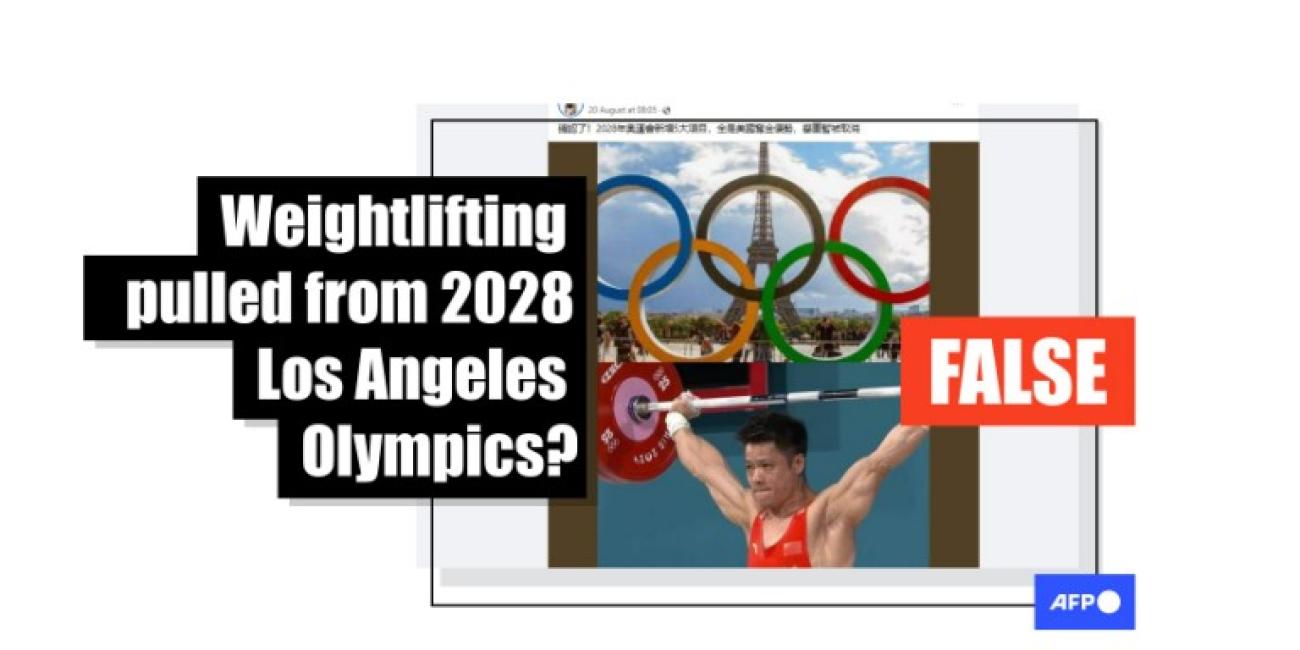
Chinese posts falsely claim US Olympic swimmer 'skipped' anti-doping tests
- This article is more than one year old.
- Published on August 9, 2024 at 09:05
- 3 min read
- By Carina CHENG, AFP Hong Kong
"Behind American Walsh's 0 tests. God knows how many drugs she took?" read a simplified Chinese Facebook post from July 31, 2024.
It appears to show drug test records for Chinese swimmers in 2023 compared to swimmers from Western countries.
According to the chart, Chinese athletes completed dozens of drug tests, while US swimmer Gretchen Walsh was not tested that year.
Walsh's team set a new world record time in Paris as they powered to Olympic gold in the women's 4x100m medley relay on August 4 (archived link).
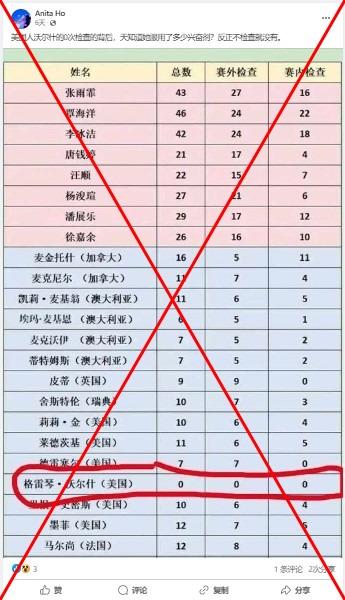
World Aquatics carried out its most rigorous drug testing programme ever in the lead-up to the Paris Olympics, with Chinese swimmers targeted (archived link).
The Chinese team arrived in Paris under a dark cloud after the New York Times reported in April that 23 Chinese swimmers tested positive for the banned substance trimetazidine (TMZ) ahead of Tokyo (archived link).
China claimed it was the result of food contamination, which was an explanation accepted by the World Anti-Doping Agency (WADA).
However, US anti-doping authorities angered their Chinese counterparts by accusing WADA of covering up the facts of the case.
Figures appearing to show Walsh was not tested in 2023 spread on Chinese platforms Weibo and Xiaohongshu; and on Facebook and X, prompting comments that China's athletes were subject to more rigorous testing than their foreign counterparts.
"Such a double standard game, shameless," one social media user commented.
"Are doping tests now based on skin colour and nationality? Enough," another wrote.
Baseless claim
Walsh was tested nine times for banned substances in 2023, according to World Aquatics and the United States Anti-Doping Agency (USADA).
Her name does not appear in 2023 records from the Aquatics Integrity Unit (AIU), the branch of World Aquatics responsible for anti-doping testing.
This is because the 21-year-old was not yet included in the Registered Testing Pool for top athletes, a spokesperson for the organisation told AFP.
"2023 was her breakout year, so she was not in that Pool at the time," they said, adding that she was nonetheless tested nine times last year.
Below is a screenshot of Walsh's 2023 test history on the AIU's website:
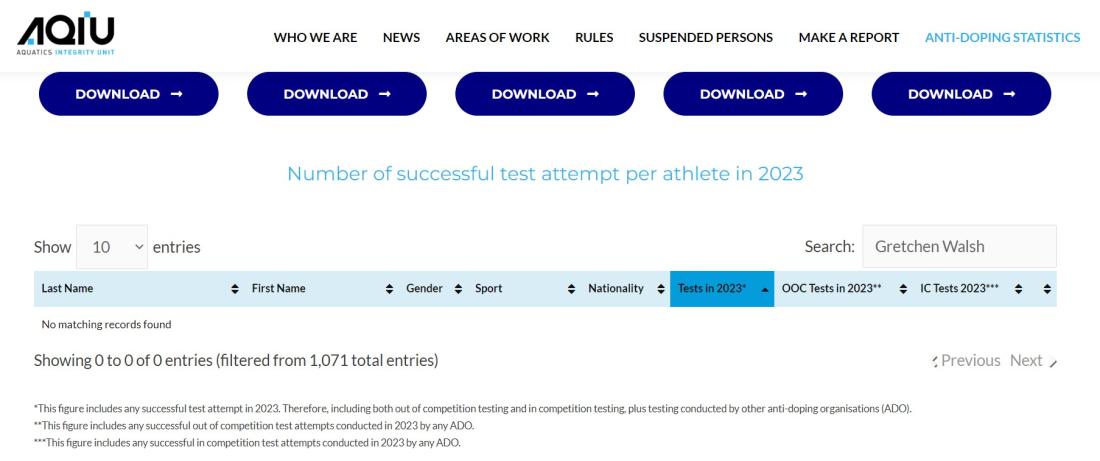
The United States Anti-Doping Agency's 2023 records, which include Walsh, show she was tested nine times that year (archived link), as shown below:
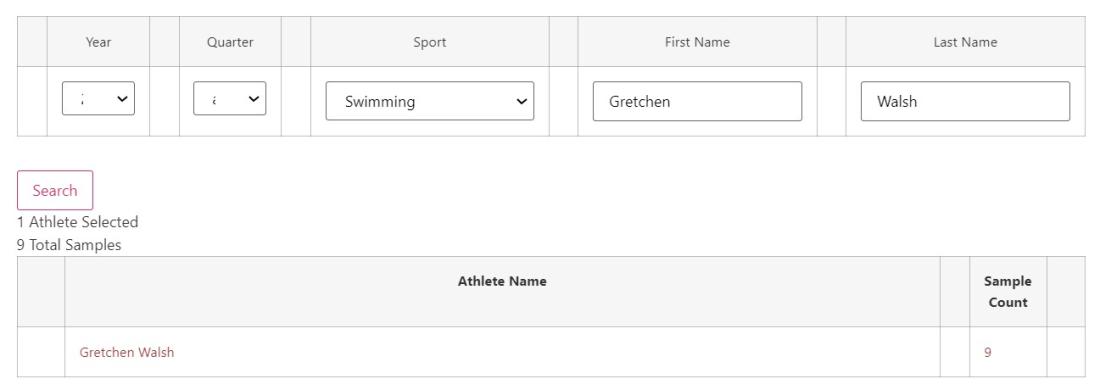
Walsh was later added to the AIU's Registered Testing Pool and her test history for 2024 -- the year of her first Olympic appearance -- was included in the database (archived link).
It shows she did nine anti-doping tests between January 1 and July 18 this year.
Chinese nutritionist's post
A reverse image search on Google found the figures circulated online appeared to originate in a since-deleted Weibo post by Chinese swimming team nutritionist Yu Liang.
Chinese state broadcaster CCTV reported on Yu's post in a July 18 article headlined: "Nearly 200 doping tests in 10 days, enough data to defend the Chinese swimmers' innocence" (archived link).
In his post, Yu said Chinese swimmers had been subjected to nearly 200 anti-doping tests since they arrived in Paris, with athletes woken up at 6am and tested several times throughout the day.
He alleged that an anti-doping official told him "you have indeed been tested too much" and "if it were any other team, you know who I'm talking about (the US team), they would already have complained".
His Weibo post is pictured below:
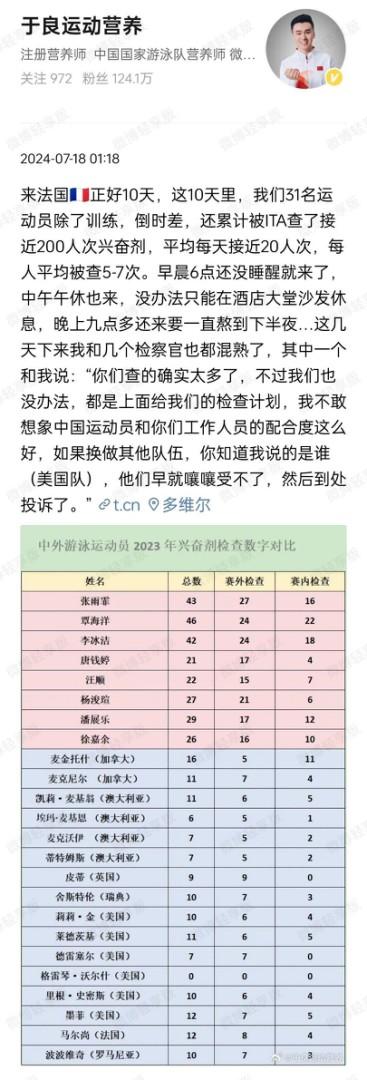
The figures in Yu's post correspond to official AIU 2023 anti-doping test records for the other athletes mentioned (archived link).
AFP has fact-checked more misinformation about the Paris Olympics here.
Copyright © AFP 2017-2026. Any commercial use of this content requires a subscription. Click here to find out more.
Is there content that you would like AFP to fact-check? Get in touch.
Contact us
